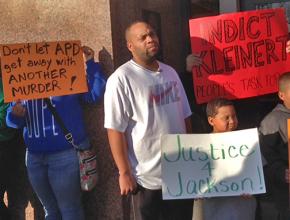Justice for Jackson
The Austin, Texas, Police Department murdered another unarmed person of color last year--but as reports, residents are fight to hold the cops accountable.
NEARLY HALF a year after one of the most appalling murders by the Austin Police Department (APD), the family of Larry Jackson Jr. remains in the dark as to why he was shot and killed by Detective Charles Kleinert.
On July 26 of last year, while police were investigating a robbery that occurred earlier in the day, Jackson tried to enter Benchmark Bank during business hours, but was stopped by locked doors. Detective Kleinert went to question Jackson, and when Jackson tried to run from the detective, Kleinert pursued him.
The detective commandeered a civilian car to hunt down Jackson to a bridge near Shoal Creek and 34th Street. After a scuffle, he shot Jackson in the back of the neck.
During a town hall meeting in response to the shooting, Police Chief Art Acevedo promised a speedy and transparent investigation to a crowd that was furious at the death of another unarmed person of color in Austin. Local resident Kristina DeWitty summed up the crowd's frustration when she said, "It's not summertime until one of our Black or Hispanic males is gunned down like a dog."

Despite the police chief's promise, Kleinert's early retirement enabled Acevedo to close the administrative investigation without having to admit whether or not his officer was responsible for any wrongdoing. Now, the only hope for justice is that a grand jury will indict Kleinert on criminal charges.
Sadly, the Travis County Attorney's Office, which is responsible for presenting the case to the grand jury, has a history of failing to seriously prosecute officer-involved shootings for various political reasons--in many cases, because of pressure from the Austin Police Association, which has the power to influence local elections.
During the same town hall meeting where the chief was chastised by the community, Assistant District Attorney Gary Cobb claimed that some prosecutors pursue cases more aggressively than others. These inconsistencies show a lack of political will from the Travis County Attorney's Office to serve the people and prosecute police who terrorize our communities.
AT A rally at the Travis County Attorney's office on January 4, the family of Larry Jackson Jr. and more than 50 supporters gathered to demand that the district attorney's office put principles before politics and secure an indictment against Kleinert.
Jackson's stepfather Larry Mercer told reporters, "We've suffered a great deal, and our judicial system doesn't seem to give us any faith that there will ever be justice."
"While people out there are going through their daily lives and living everything like nothing happened," said Larry's cousin Phillip Wilson, "we have to go through days and think of the memories of Larry, not able to touch him, call him, to speak to him on a daily basis."
When Assistant Police Chief Brian Manley was asked by the city's Human Rights Commission if the Austin Police Department was racial profiling, he simply responded, "Biased-based profiling is not tolerated in our department." Yet the APD's annual Racial Profiling Report paints a very different picture.
The data the department uses is collected from vehicular traffic stops, and is divided by consent and non-consent searches. Consent searches occur when the officer asks for permission to conduct the search, and the citizen consents to be searched. Non-consent searches occur after an arrest, or if the officer claims probable cause.
The report says that if you look at the hit-rates between races--searches where contraband is found--"the relatively similar hit rates for white, Hispanic and Black motorists suggests that profiling is not occurring." What their summary fails to mention is that consent searches only make up 4 percent of vehicular traffic stops.
Non-consent searches make up 91 percent of their data, and when you compare the number of stops to the voting-age population for each racial group within Austin, African Americans and Hispanics were stopped at a rate well above their representation in the cities voting-age population. African Americans have a one-in-six chance of being stopped and searched by police, while whites have a one-in-19 chance.
APD's track record, like the track record of police departments across the nation, shows little to no regard for Black and Brown lives. Such callous disregard for the rights of racial minorities deserves to be called what it is--institutionalized racism.
We won't ever get the APD to admit that they racially profile, even when their own report proves it, but we can build the political force to break the cycle of injustice. The grassroots organization People's Task Force, which formed just three days before Larry Jackson Jr.'s death, is working to build that political power and help families who have been victimized by the police.
By coordinating reading groups, organizing rallies and connecting families who have been victimized by police brutality, they are building the foundation to challenge the forces that seek to keep our communities living in fear.
What we can do right now is support the Jackson family and others who have been victimized by the police and let other people know about the injustices our communities face. If we build the political force to challenge these institutions, we can begin to initiate the kind of solutions we want to implement in our own neighborhoods.
Rather than handing over more money to police departments to increase surveillance and acquire the latest weapons and gear, let's get to the roots of crime and put money toward creating jobs which are desperately needed in our communities.
We can't expect the powers that be to hold the police accountable, because those same powers rely on the police to maintain control over working-class people when they get fed up with day-to-day misery that is capitalism. It's time we start taking control of our communities again, house by house, neighborhood by neighborhood, and implement the changes we want seen.


